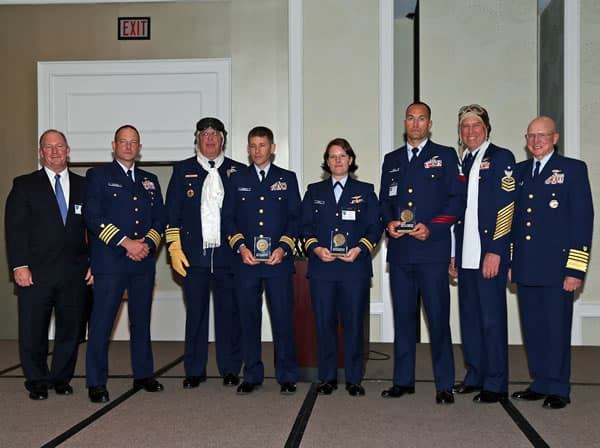The Captain Frank A. Erickson Award goes to the Air Station Elizabeth City crew of CGNR 6012 in recognition of their heroic efforts on 29 October 2012.
The crew of MH-60T CGNR-6012, alerted to the serious situation of HMS Bounty offshore, launched on the morning of 29 October 2012 into darkness, turbulence, 60 knot winds and driving rain bands. The first rescue helicopter to reach the scene, CGNR-6012 executed an instrument descent under no illumination and gained visual contact with the surface at 300 feet. Immediately vectored by HC-130J CGNR-2004 to a survivor floating freely in a survival suit amidst the debris field of bounty and realizing that conditions were worse than expected, rescue swimmer petty officer Haba was launched into gale force winds and 30 foot seas to rescue the survivor. After two failed attempts due to the large waves and strong current, LCDR Cerveny aggressively maneuvered the helicopter into position for the successful hoist of the survivor and swimmer to safety. CGNR-6012 then investigated two empty rafts and located the remaining bounty crew shortly after dawn in two other life rafts. With LT Pena monitoring altitude correctness for incoming waves, petty officer Lufkin expertly conned the pilot to position the aircraft and lowered the swimmer into the churning debris. Demonstrating determination, flawless teamwork, crew coordination and exceptional aerial skill, the crew successfully rescued four survivors despite the swimmer losing his mask and snorkel in the breaking waves. Their meticulous search of bounty wreckage set the stage for the rapid recovery of the remaining nine survivors after CGNR-6012 was forced to depart scene due to fuel remaining. During the two hour return flight though 60 knot wind and turbulence, petty officer Haba continue to provide medical care to the five survivors until they could be transferred to awaiting emergency medical personnel. The crew of CGNR-6012 reconciled risk management with operational imperatives and competence under extremely challenging and dangerous conditions. Their performance is in keeping with the tradition of Captain Frank Erickson adding a proud chapter to the proud history of Coast Guard aviation.
